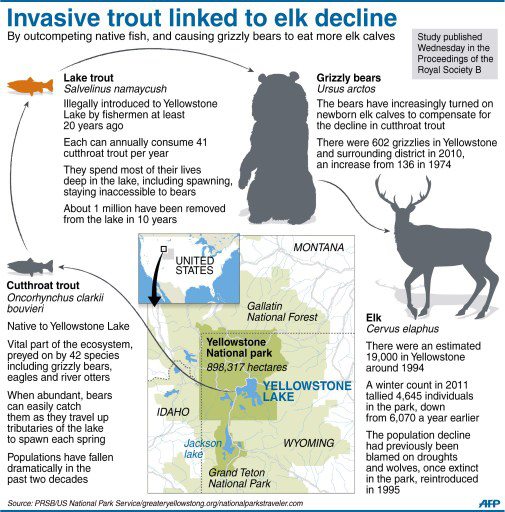
RESEARCHERS trying to explain
declining elk numbers in the Yellowstone National Park (YNP) placed part
of the blame on Wednesday on a previously unlinked phenomenon - a
predatory trout invasion.
In a vicious circle of human
interference that underscores the delicate balance of nature, the team
said the illegal introduction of lake trout more than 20 years ago
changed the diet of a key Yellowstone predator, the grizzly bear.
The lake trout eat the bears'
traditional prey, native cutthroat trout, and spawn in deeper waters
where the grizzlies cannot reach them.
The bears, in turn, have started
feeding more heavily on newborn elk calves, shifting the balance in
their formerly fish-heavier diet.
"This synthesis suggests that even
in core wilderness areas like Yellowstone, a human blunder in the
aquatic system many years ago can have far-reaching impacts by forcing
an omnivorous predator to seek new foods in the terrestrial landscape,"
said study leader Arthur Middleton of the University of Wyoming.
The researchers arrived at their
conclusions from a synthesis of over 20 studies of bear diet and elk
populations conducted between 1985 and 2012, as well as recent elk
counts.
Most of the elk decline had
hitherto been blamed on successive droughts and the reintroduction from
1995 of wolves that were extinct in the park by the 1970s.
Elk are migratory and spend their
winters between 40 and 140 kilometres outside Yellowstone, which meant
the effects of the cutthroat decline could reach far beyond park
boundaries, the team said.
It may also hold implications for the management of wolves blamed for elk decline in areas that rely heavily on hunting.
"Our work highlights the importance of efforts by YNP to suppress lake trout in Yellowstone Lake," Middleton said.
"If YNP can suppress lake trout low
enough that native cutthroat trout can rebound, there could be major
benefits for other species in the ecosystem."
The findings also highlight the need to coordinate fisheries and terrestrial wildlife management.
"If fish can affect elk, it means
that if we don't look at what's going on in the fishery, we might not
fully understand what's happening on the land," Middleton said.
source - Lobos of the Southwest
source - Lobos of the Southwest

No comments:
Post a Comment